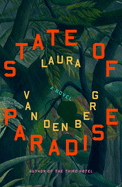
"In Florida, nature is seductive and full of vengeance," writes Laura van den Berg in her uncanny third novel, State of Paradise, which is set soon after the onset of a Covid-like pandemic. Insecticide-resistant grasshoppers invade, carrion birds circle, lizards turn up on dogs and human heads, and scores of cats congregate in the neighborhood and in dreams. Climate and geography also play roles: sinkholes appear, torrential rainstorms batter the landscape, and the threat of climate catastrophe hangs as heavy as the humidity that blankets the region.
The unnamed narrator, a writer in her late 30s, and her husband, a history professor, are living with her bitterly divorced mother in an old house in "a small town northeast of Orlando." Living next door--despite a contentious relationship with the mother--are the narrator's sister, brother-in-law, and young niece. The sisters also have beef stemming from when the narrator was a suicidal addict in her teens and early 20s. A headset called MIND'S EYE provides an escape, first for the sister and then for the narrator. The device, ostensibly for meditation, sparks a quest involving their dead father, who tells the sister, "There is something I want you to do." Reality, already tinged with the surreal, becomes even more skewed when the sisters take a road trip to find the narrator's mysterious employer, a thriller author who relies on an army of ghostwriters. The eerie atmosphere van den Berg (The Third Hotel; I Hold a Wolf by the Ears) so masterfully delivers enhances the novel's rich psychological and familial territory. --Nina Semczuk, writer, editor, and illustrator

